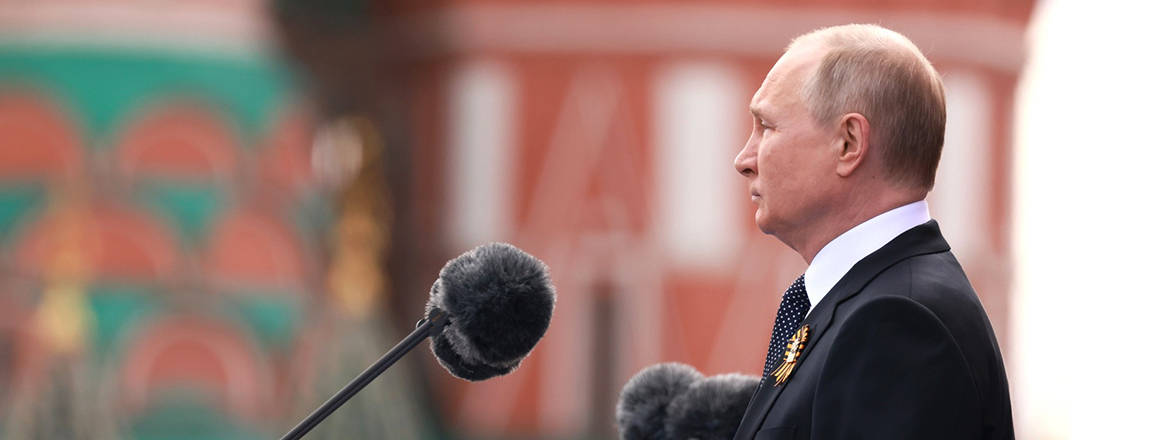Victory Day Was Just a Day: Trying to Penetrate Russia’s Thinking
Putin’s speech told us little about how the war in Ukraine may unfold, but the anticipation of the day revealed our over-reliance on symbolism and signalling in a war that is messy, and where the views of the Russian leadership are difficult to divine.
In the end, expectations that the Victory Day parade in Moscow might tell us something about the likely course of the Ukraine war were dashed. The run-up to Russia’s annual military display, which commemorates the Soviet victory over Nazi Germany in the Second World War, was filled with anticipation and speculation: whether President Vladimir Putin would use this as an opportunity to escalate by declaring the ‘special operation’ a war and announcing a full-blown conflict, or perhaps announce a limited victory instead, recognising some of the Russian-held southern parts of Ukraine as independent statelets.
None of these things happened on the day, and Putin’s speech was devoid of any signals that might have helped to divine some sort of meaning from an increasingly brutal war. An excessive focus on timing reflects a desire to exert a semblance of control, and our reliance on such symbols highlights how little we are able to penetrate the thinking of the Russian leadership in a useful way.
Every year, Moscow uses narratives around Victory Day and its accompanying parades to showcase its military hardware, as well as to emphasise existential threats to the country. As expected, this year, much of Russia’s military hardware was either irreparably damaged or in use at the front, and so the display was less impressive than in previous years. There was time for somewhat macabre photo opportunities, including Putin laying flowers at monuments to ‘heroic cities’ of the Second World War, including Kyiv and Odessa, as the fighting around Mariupol and the strategic Azov port continues unabated. There was notably no foreign representation, which was explained away by Kremlin spokesman Dmitry Peskov – in case anyone might take it as evidence of Russia’s diplomatic isolation – by maintaining that this Victory Day was not a jubilee year. Since Russia’s 2014 annexation of Crimea, foreign representation at the parade has become increasingly contentious – in 2017, only Moldovan President Igor Dodon attended. But all of these symbols were immaterial in comparison with Putin’s much-vaunted speech.
In the end, Putin gave us little to go on. He did not make any mention of victory, or proffer statements that could have been framed as a potential end to the war – nor did he include specific references to Mariupol, which Russian forces have as yet failed to take.
Effective repression of the media and freedom of assembly has made it very difficult to determine different perspectives that deviate from the official line
But there were also no allusions to significant escalation or mass mobilisation. As Russia’s supply lines wear thin and its offensive pushes on to Odessa, there may be background efforts underway to mobilise fresh troops in a limited capacity, with anecdotal reports on social media suggesting that some reservists have been called to service. But many of these reservist notices circulating online are standard conscription notices – Russia has a biannual conscription, which begins in spring and runs for around two months. Even if Putin had called for mobilisation in his speech, the effects would not be felt immediately, nor would this offer a quick victory – most of the technically qualified and trained troops have already been called up, and it will take time to train and prepare civilians.
Back to Kremlinology?
In theory, speculation that Putin might use the day as a springboard for some sort of change of tack made sense. It would have made a neat analogy for the authorities to draw parallels between Russia’s framing of the Ukraine war as a fight against fascism, and the Soviet defeat of Nazism. But perhaps the comparison was too neat, and too obvious. There were comments across social media that Putin’s speech was short, at just 11 minutes – but last year’s speech was short too. The problem is that this year, we were hoping for more, because we understand so little about what is going on in the minds of the Russian leadership.
In comparison to the significant and varied amount of information coming from the Ukrainian side, in Russia, effective repression of the media and freedom of assembly has made it very difficult to determine different perspectives that deviate from the official line. There are no foreign or Russian correspondents embedded on the front line with Russian soldiers offering reportage, and in a war that is playing out on social media – with Twitter and TikTok providing the most compelling and real-time details of the war – it has become increasingly difficult to piece together what the Russian senior leadership are thinking.
Sometimes it is what is not said that is significant. Ahead of Victory Day, deputies from the legislative assembly of St Petersburg were asked to record messages of congratulations that were later published on social networks. But the message from the head of the Yabloko faction – a political party not represented in the Duma and which has consistently opposed the war – was cut after he called for a ceasefire in Ukraine to end civilian and military casualties. But other political parties have fallen behind the Kremlin’s narrative and have not taken up Yabloko’s stance, so it is not clear whether their views on a ceasefire are more broadly shared in the Duma.
This makes it a challenge to understand how far apart the Russian leadership’s views of the war – or professed views – are from the Russian public, and the extent to which these divisions could reveal something about political stability. Surveys and vox pops offer only a snapshot of public opinion – notwithstanding some serious attempts by independent Russian journalists to unpack this �– and the well-funded propaganda machine has elided many of the social commentators from outlets such as Ekho Moskvy who had previously been relied upon to give an alternative perspective. Occasional leaks of information on dissatisfaction among the security services and the military offer an insight into institutional rivalry, but it is not clear how far these problems extend up to the most senior levels of power. Perhaps this is why we are resorting to Soviet-era Kremlinology: reading between the lines and hoping for some missed symbolism, while relying on dates to offer some clarity about the likely direction of the war.
The idea that Russia was compelled to go to war, but that the timing was on Russia’s terms, seems contradictory, and appears to cast Russia on the back foot
In this vein, and in the absence of any real new information, perhaps some of Putin’s language might offer us a window into his thinking. Putin’s speech was light on details, repeating his justification for the Ukraine war, well-trodden narratives on the juxtaposition of Russian values against those of the West, as well as complaints over NATO’s military involvement in countries ‘adjacent to’ Russia. But while he gave away few specifics, Putin’s language and phrasing were revealing.
He called the war a ‘pre-emptive rebuff’ (upredayushi otpor) to NATO, in response to the ratcheting up of tensions over Ukraine. But despite Putin’s characterisation of this response as the decision of a ‘strong, independent country’, the word ‘rebuff’ suggests a defensive country, almost backed against the wall. In Russian, one can davat’ otpor – strike back, ward off or even counter – which implies a degree of measure, rather than escalation. In the absence of much information from the speech about his intent, this may at least suggest that significant escalation may not be on the cards.
But Putin then framed the war as both ‘forced’ (vynuzhdenniy) upon Russia, as well as being timely and the ‘only correct decision’ to have made. The idea that Russia was compelled to go to war, but that the timing was on Russia’s terms, seems contradictory, and appears to cast Russia on the back foot – it is not the tone of a victor, nor of a leadership attempting to inspire, but rather a grim reminder of the reality of war. This came alongside numerous references to death and self-sacrifice – Putin did acknowledge deaths among military officers and offered state support for their families, as it has become harder to deny the significant casualties the Russian army is thought to have sustained. These references to casualties and the importance of sacrifice were then amplified by Vyacheslav Volodin, speaker of the Duma (parliament), suggesting that the leadership is laying the groundwork to prepare the Russian public for the high number of casualties.
Ultimately, in the coming weeks, there may be a limited mobilisation to renew supply lines, or to provide fresh troops to support the burgeoning Russian-controlled ‘people’s republics’ in southern Ukraine. But what we do know is that the Russian leadership will do this when the time is right, and not before.
The views expressed in this Commentary are the author’s, and do not represent those of RUSI or any other institution.
Have an idea for a Commentary you’d like to write for us? Send a short pitch to commentaries@rusi.org and we’ll get back to you if it fits into our research interests. Full guidelines for contributors can be found here.
WRITTEN BY
Emily Ferris
RUSI Senior Associate Fellow, International Security
- Jim McLeanMedia Relations Manager+44 (0)7917 373 069JimMc@rusi.org


